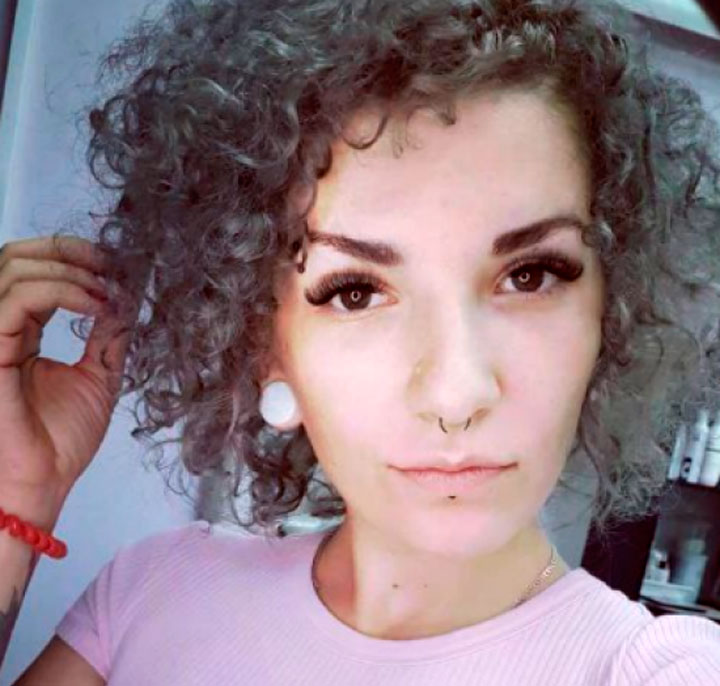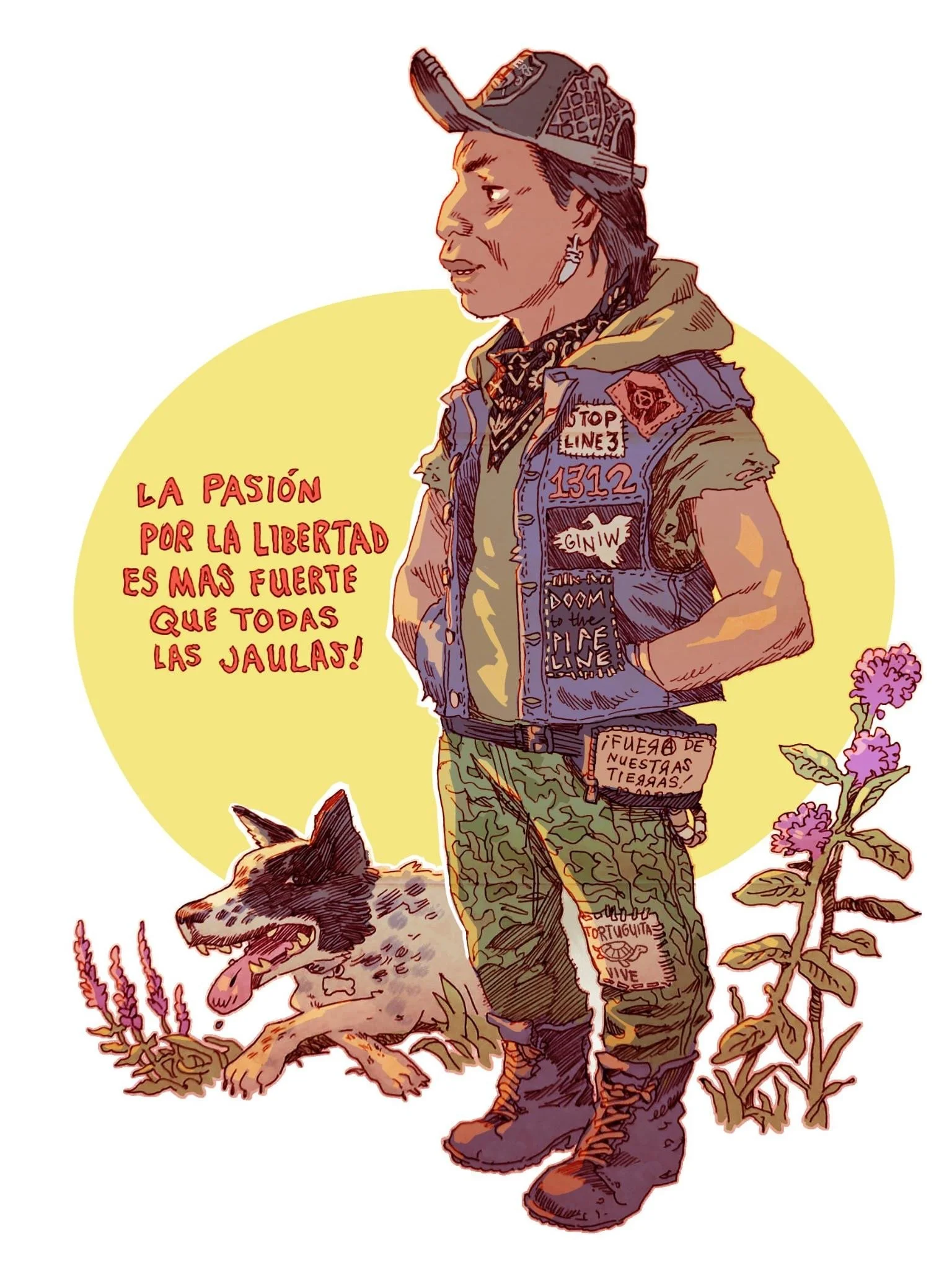From Prison Radio Instagram
Prisoner Solidarity
Mumia is an award-winning journalist and was one of the founders of the Black Panther Party chapter in Philadelphia, PA. He was a vocal supporter of the MOVE organization and has struggled for justice and human rights for people of color since he was at least 14 years old- the age when he joined the Party. He left the party to become a radio journalist where he made waves defending the rights of black and brown people. In 1981, he was elected president of the Association of Black Journalists Philadelphia Chapter.
Arrest
On December 9, 1981, Mumia, who moonlighted by driving a taxi, happened upon police who were beating his brother. During the melee, a police officer was shot and killed.
Trial
The prosecutor, Joseph McGill, presented a story that has Mumia running behind the officer and shooting him in the back. He then claimed that the officer turned around and pulled his weapon shooting Mumia in the chest. McGill ends the story by saying the officer fell to the ground where Mumia stood over him and unloaded on him, missing with four shots but hitting him once between the eyes. McGill also claimed that Mumia confessed to the shooting later on in police custody.
Conflicting Evidence
None of the physical evidence supports the prosecution's case. Mumia did legally own a gun, not uncommon for anyone driving a cab in Philadelphia during that time. However, the police never tested his gun to see if it had been fired nor tested his hands to see if they had recently fired a gun. They bullet taken from Faulkner could not be matched to Mumia's gun. There were no divots in the sidewalk around the officer's head as there would have been if the shooter had stood above him. The only bullets that were found were approximately eight feet west to where Faulkner was laying and were from an angle that would not have been possible from the trajectory where Mumia entered the scene. The bullet wound that hit Mumia also debunks the prosecution's scenario. The bullet was traveling at a hard downward trajectory suggesting that his body was learning forward while still running to the scene when he was shot, and that the officer was elevated, likely standing on the sidewalk.
The prosecution witnesses told different stories in their original statements than they did at trial. One, a prostitute named Cynthia White, changed her story five times by the time she reached trial. Another, a cab driver named Robert Chobert, who was driving with a suspended license while on probation for arson, first told arriving officers, "the shooter ran away." He then said the shooter ran thirty feet and fell despite the fact that Mumia was laying less than three feet from Faulkner. Crime scene photographs that were never disclosed to the defense until 2007 show that Chobert was not parked where he said he was. They also confirm that there were no bullet divots around Faulkner's head, that police collected evidence incorrectly - damaging its integrity, and that the officer's hat had been moved from its original place on the roof of a car suggesting that Faulkner was talking to a passenger. Four different witnesses claimed that they saw someone running from the scene.
Perjured Evidence
There were three different police officers who claimed that Mumia confessed. The only officer who testified at trial, Gary Bell, claimed that after Mumia was brought into Jefferson hospital for his gunshot wound that he yelled, "I shot the motherfucker and I hope the motherfucker dies." However, the officer never made a report of the incident and claimed to have forgotten this crucial information for over sixty days. He had no recollection until after Mumia's defense attorney file police brutality charges due to the fact that the officers beat him when they arrived on the scene. After that filing all three officers came forward in the subsequent weeks with stories of a confession. The two other officers, Gary Wakshul and Thomas Bray came forward and neither of them had made a report on the night of the shooting. Wakshul even went as far in his original report to say, "The male negro made no statements." He made a second report a week later where he offered recollections of tiny details even so far as to remember the make and model of a camera found in Faulkner's car but made no mention of a confession. He later claimed that he just forgot. The doctor who operated on both Mumia and Faulkner heard no confession and neither did any of the hospital staff. None of the officers corroborated each others stories.
After the police officers came forward with a confession story a hospital guard named Priscilla Durham came forward and claimed she heard a confession as well, but never alerted the police. She was interviewed by the prosecution and brought to trial. During the trial she claimed, for the first time, that she made a handwritten report about the confession the day after the shooting but only gave it to her superior officer. She somehow never mentioned this to the prosecution or the police despite being interviewed by both. During the trial the judge sent a police officer to the hospital who returned with a piece of paper that was not on hospital letterhead, was typed, and was not signed. This document was allowed to be submitted as evidence over the objections of the defense.
Mumia had a court-appointed lawyer who did not have the funds to investigate witnesses or do any ballistics investigations whatsoever. The judge who presided over the case was Albert Sabo, a former Sheriff and member of the Fraternal Order of Police who presided over more trials ending in death sentences than any other judge in the US. A third of all lawyers surveyed by the American Bar Association in Philadelphia said that he was unfit to be on the bench.
Despite all this, Mumia was convicted and sentenced to death in a trial that was rife with perjured testimony and manufactured evidence that Amnesty International found, "did not meet the minimum international standards for a fair trial."
Appeals
During Mumia's Post Conviction Relief Act Hearings Judge Sabo was brought out of retirement to preside. He sustained every single prosecution objection and quashed most of the subpoenas brought forth by the defense. He did not find that Mumia deserved a new trial and said so in a finding of fact that was a carbon copy of the prosecution's closing brief.
During the summer of 1995, a death warrant was signed by Governor Tom Ridge, which sparked one of the most effective organizing efforts in defense of a political prisoner ever. Since that time, Mumia has had his death sentence overturned but still has a life sentence with no opportunity for parole.
The Pennsylvania Supreme Court has a long and openly biased history when it comes to justice for political prisoner Mumia Abu-Jamal, having denied all his appeals over the 37-year ordeal to win his freedom. True to form, on Feb. 24, four justices on the state’s highest court granted an extremely rare King’s Bench Petition backed by the Fraternal Order of Police to move jurisdiction over Abu-Jamal’s current appeal away from Philadelphia District Attorney Larry Krasner’s office.
While King’s Bench was not intended for use by an individual or group simply displeased with a government action, it appears that the Pennsylvania Supreme Court continues to make exceptions when it comes to the police. Many justices on this court, including two on the panel that ruled in favor of the petition, receive FOP funding.
This court’s actions delay Abu-Jamal’s pending appeal, which just happens to involve charges of misconduct by a former member of the same court, retired Justice Ronald Castille. His well-established alliance with the FOP and bias against Abu-Jamal is central to this case. Now the FOP and Faulkner want to replace DA Krasner with Attorney General Shapiro, who has established a reputation of bias against prisoners seeking justice. When Krasner took office in January 2018, he fired several old guard prosecutors, including some who had been part of prior DA’s prosecution of Abu-Jamal. Many were subsequently hired by Shapiro. In a 1997 decision, Commonwealth v. Mulholland, the higher court ruled against a King’s Bench petition that sought to replace a prosecutor with one thought to be more favorable. The court called this request “prosecutor shopping.”
Media
While imprisoned he has published multiple works of literature and recorded several video interviews making social commentary on today's conditions. He has remained a regular on the prison broadcasted radio shows as well as teaching class on Georgist economics to fellow prisoners around the globe. HBO also created a documentary about the life, arrest, and struggles with the law of the activist called "Mumia Abu- Jamal: A Case for Reasonable Doubt."
Mail Regulations
In 2018, the PA Dept of Corrections instituted a restrictive mail policy where all mail to prisoners must be sent through a mail processing facility in Florida where all correspondence is scanned, copied and then the copy is mailed to the prisoner. There is an active campaign to get Gov. Wolf to repeal the restrictive policy so that friends and family members can send mail such as greeting cards again.
Smart Communications/PADOC - Mumia Abu-Jamal AM-8335
SCI Mahanoy
P.O. Box 33028
St. Petersburg, FL 33733
United States
Support Website
Sponsored by ABC Federation

 Toby Shone
Toby Shone



